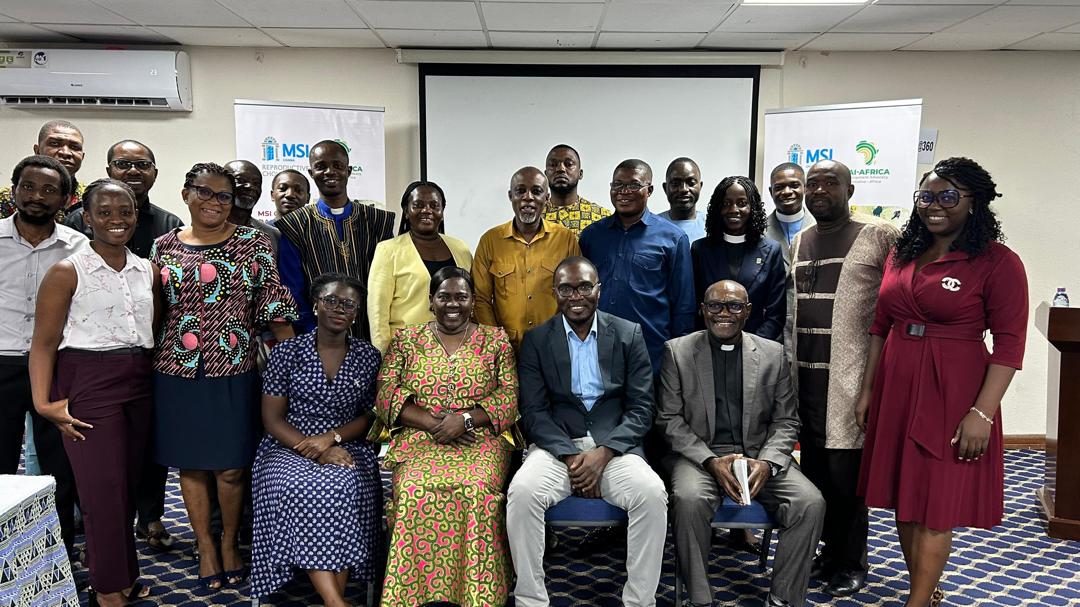Effective Population Management: The Role of the Clergy Project
DAI-Africa is partnering with Marie Stopes Ghana to promote advocacy for family planning education and services through the Clergy in Ghana. The project seeks to create a supportive environment for reproductive health education and services, contributing to the broader national strategy for effective population management.

Background
Ghana’s population currently stands at approximately 32 million (2023 estimates), with an annual growth rate of 2.1%, as reported by the 2021 Population and Housing Census (Ghana Statistical Service, 2022b). The country is also grappling with a fertility rate of 3.9 % (Ghana Statistical Service, 2022a). If these rates persist, projections indicate that the country’s population could exceed 60 million within the next 30 years. Meanwhile, historical accounts of the nexus between Ghana’s population growth rates and development show that the rapid population growth has significantly outpaced development efforts, due to the creation of an age structure that is unable to support high economic productivity. The situation has resulted in a dual challenge for the nation. On the one hand, Ghana, as with nearly all countries in Sub-Saharan Africa, is adding large numbers to its population each year. On the other hand, the country is failing to effectively harness the potential of the existing population for accelerated development, due to the immense pressure on limited fiscal resources.
Despite recent declines, there is still a huge number of dependents, particularly children under 15, who constitute nearly 38% of the population. This large consumer base results in a high dependency ratio, placing immense pressure on the working population. Consequently, the labor force struggles to save, invest, create wealth, and build a sustainable future for both them and the nation (Appiah, 2024). Ideally, the number of productive hands generating wealth and revenue should far exceed the number of dependents. With 25% of Ghana’s population living in multidimensional poverty (Ghana Statistical Service, 2023), it is unlikely that successive governments will be able to significantly improve the socioeconomic conditions of Ghanaians without aligning population growth rates with national development goals.
Equally important, evidence shows that countries like Ghana, with median ages [the age at which half of the population are younger] below 26years, [Ghana’s median age is 20.5 years] stand the risk of being persistently trapped in the quagmire of low-income and underdevelopment, if strategic investments into programs which can accelerate the age -structural transition, and have the median age between 26years -45years, such as reproductive health education and family planning, are not prioritized and implemented (Cincotta, 2023). In addition to the economic challenges characteristic of countries with low median ages, there is also the increased risk of political instability, particularly revolutions and recurring coup d’etats (Cincotta & Weber, 2021).
Addressing the above challenges posed by high population growth rates requires broad stakeholder support in education, sensitization, service delivery, and advocacy. A key stakeholder in this respect is the Church. Given that 71% of Ghana’s population identifies as Christian, the Church holds considerable influence, second only to the government. This positions the Church as a crucial partner in the discourse on reproductive health and population management in the country. The Church’s influence in premarital and post-marital counseling, health service delivery, education, and support for the socially vulnerable offers significant leverage for effective population management at both household and national levels.
Goal:
The project’s goal is to foster a supportive environment for reproductive health education, services, and advocacy through strategic partnerships with the clergy. This initiative aligns with the broader national strategy to increase family planning uptake and reduce fertility rates to levels that support the country’s development aspirations, through partnerships with key stakeholders.
Objectives:
The specific objectives of the project are as follows:
Establish strategic partnerships with key faith-based organizations to promote family planning.
Build the capacity of selected clergy members in family planning and advocacy, empowering them to serve as ambassadors for family planning.
Support trained clergy in conducting advocacy efforts at both national and local levels to encourage the promotion and uptake of family planning services.
Activities:
Activities on the project include evidence generation, Masterclass workshops, radio and TV advocacy, publication of opinion pieces on family planning by the clergy, and the organization of family planning talks in churches via multiple platforms, including women’s fellowship meetings, family week celebrations, marital counselling, etc.
